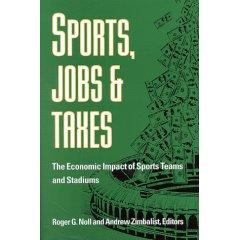| 2020ok Directory of FREE Online Books and FREE eBooks |
Free eBooks > Business & Investing > Economics > General > Sports, Jobs, And Taxes: The Economic Impact Of Sports Teams And Stadiums
Sports, Jobs, And Taxes: The Economic Impact Of Sports Teams And Stadiumsby Roger G. Noll And Andrew Zimbalist  Download Book (Respecting the intellectual property of others is utmost important to us, we make every effort to make sure we only link to legitimate sites, such as those sites owned by authors and publishers. If you have any questions about these links, please contact us.) link 1 About Book Book Description America is in the midst of a sports building boom. Professional sports teams are demanding and receiving fancy new playing facilities that are heavily subsidized by government. In many cases, the rationale given for these subsidies is that attracting or retaining a professional sports franchise--even a minor league baseball team or a major league pre-season training facility--more than pays for itself in increased tax revenues, local economic development, and job creation. But are these claims true? To assess the case for subsidies, this book examines the economic impact of new stadiums and the presence of a sports franchise on the local economy. It first explores such general issues as the appropriate method for measuring economic benefits and costs, the source of the bargaining power of teams in obtaining subsidies from local government, the local politics of attracting and retaining teams, the relationship between sports and local employment, and the importance of stadium design in influencing the economic impact of a facility. The second part of the book contains case studies of major league sports facilities in Baltimore, Chicago, Cincinnati, Cleveland, Indianapolis, San Francisco, and the Twin Cities, and of minor league stadiums and spring training facilities in baseball. The primary conclusions are: first, sports teams and facilities are not a source of local economic growth and employment; second, the magnitude of the net subsidy exceeds the financial benefit of a new stadium to a team; and, third, the most plausible reasons that cities are willing to subsidize sports teams are the intense popularity of sports among a substantial proportion of voters and businesses and the leverage that teams enjoy from the monopoly position of professional sports leagues. About the Author Roger G. Noll and Andrew Zimbalist have consulted for players associations and owners in professional sports. Noll is professor of economics and director of the Public Policy Program at Stanford University and a nonresident senior fellow at the Brookings Institution. He is the author of numerous books, including the classic Government and the Sports Business (Brookings, 1974). Zimbalist is professor of economics at Smith College and the author of several books, including Baseball and Billions: A Probing Look Inside the Big Business of Our National Pastime (Basic Books, 1992). He was also a consultant for the nine-part documentary on baseball in America by Ken Burns. Related Free eBooks
| Related Tags |












SEND A COMMENT
PLEASE READ: All comments must be approved before appearing in the thread; time and space constraints prevent all comments from appearing. We will only approve comments that are directly related to the article, use appropriate language and are not attacking the comments of others.